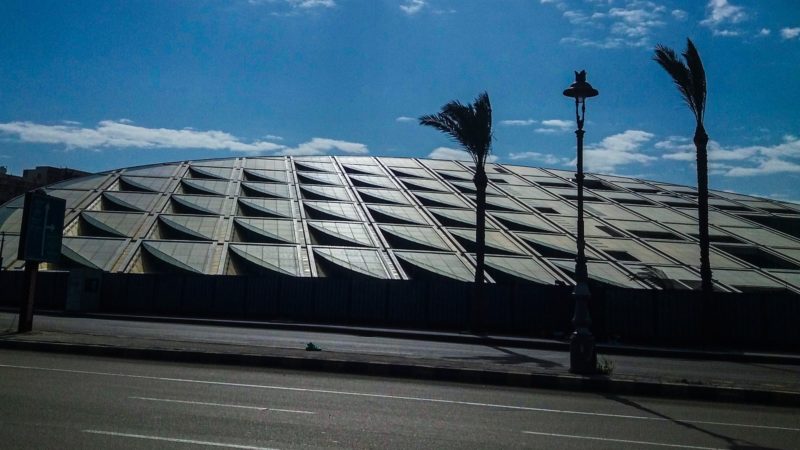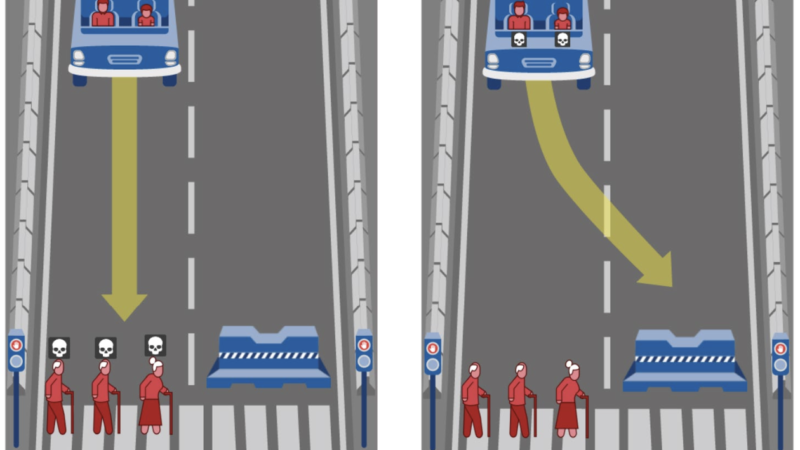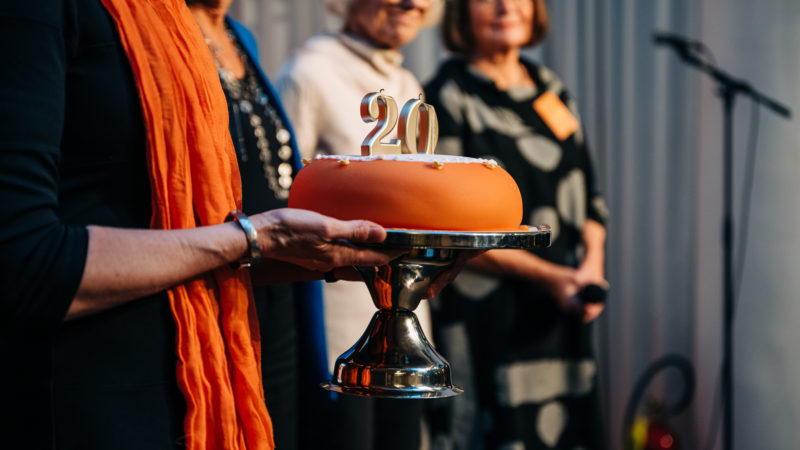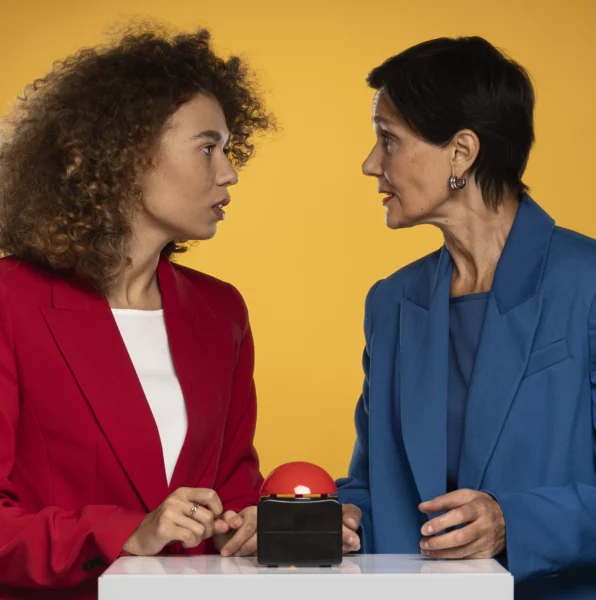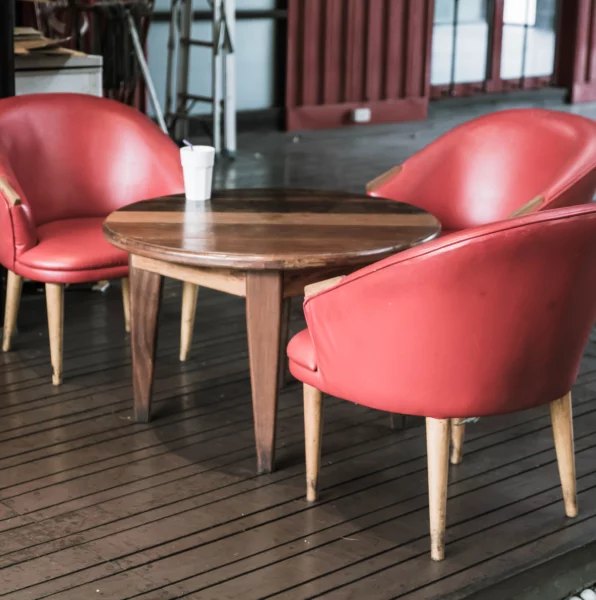How can the public get involved in science? Creating our Future called on people in Ireland to submit ideas for science in 2021. Ciara Cotter of the Science Foundation Ireland reports on the results and themes that emerged from the nationwide survey.
Creating Our Future – A national conversation on research in Ireland
The value and impact of public investment in research and researchers was brought into stark relief by the COVID-19 pandemic. The public and policy-makers looked to science for a way forward and ultimately for the successful development of a vaccine in record time. In the midst of this global pandemic, while we still struggled with how to reopen our society, we built on the public’s interest in research by asking them to consider how research could contribute to the creation of a better future for everyone.
Creating Our Future was a unique public engagement activity on research, at a scale not undertaken in Ireland previously. The engagement was based on international best practice, learning from other countries that had opened a similar dialogue on research with the public in their countries. We met with colleagues who led The Flemish Science Agenda and the Dutch National Research Agenda. Both exercises unified people across the Netherlands and Flanders to consider what areas of research were important to them. Very early in our journey we realised that we could learn from the experiences of those exercises but importantly, create something unique for the Irish context.
In Ireland, the campaign was championed by the then Taoiseach (Irish Prime Minister), Micheál Martin and Minister for Further and Higher Education, Research, Innovation and Science, Simon Harris. During August to November 2021, the people of Ireland were invited to submit their ideas. The campaign asked the public to send us their ideas based on a flexible, open-ended question:
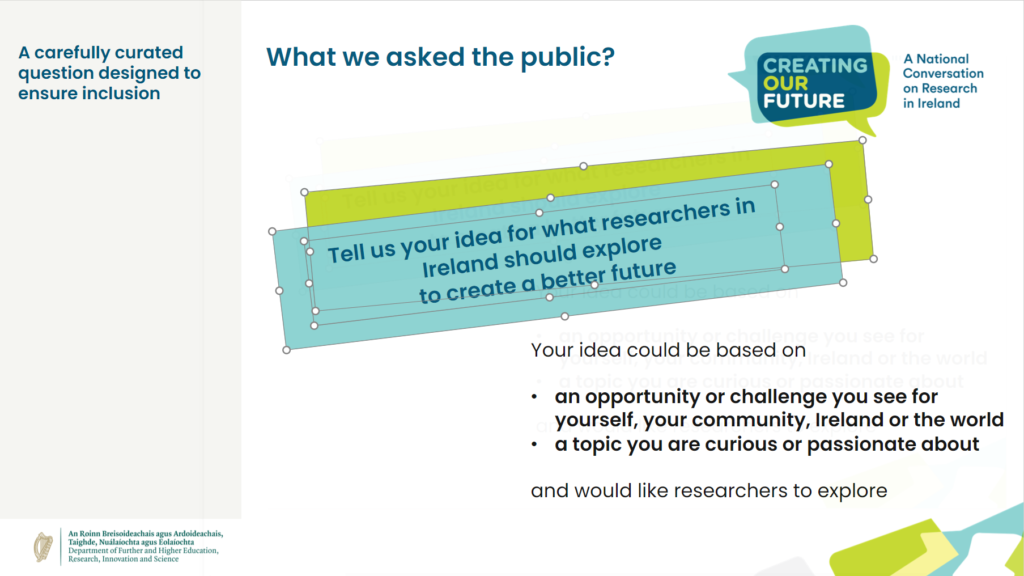
What set this exercise apart from other national campaigns was the extent of the inclusive dialogue on research. From Donegal in the North to Kerry in the South, people gathered in town squares, car parks, community centres, schools, higher education institutions, and companies to discuss how research can play a role in creating a better future for everyone. This “national brainstorm” brought those that would not usually participate in discussions on research into the conversation. Marginalised groups and younger people were proactively encouraged to get involved. The conversation was brought to their doors through interactive sessions involving researchers that are passionate about telling the story of the research. All of this activity drove the audience to an online portal which captured all of the submissions.
The results of the biggest Irish “brainstorm”
We had set a target to try to achieve over 10,500 submissions and of utmost importance was to ensure we had an inclusive dialogue and widespread engagement from all sectors of society. However, we had underestimated the level of engagement and when the portal closed at the end of November 2021, a total 18,062 valid submissions were received from people of all ages, communities, sectors and counties. This achievement was down to the many individuals and groups that supported the campaign, including the governmental and societal representatives on the Advisory Forum, chaired by Julie Byrne Head of External Collaborations, Nokia Bell Labs. The Advisory Forum supported and challenged the Campaign Team to ensure it remained true to the North Star of an inclusive and accessible dialogue. This partnership with a diverse group of stakeholders was a vital component in achieving the level of diversity in our submissions.
With the closure of submission stage, we moved to the task of reading, categorising and synthesising the 18,062 unqiue ideas. The Expert Committee, chaired by Professor Linda Hogan, Trinity College Dublin, along with 70 volunteer national and international researchers from across all disciplines, worked in 7 multi-disciplinary teams to analyse the findings and to bring their expertise to the task of categorising the ideas from the public. All ideas were read. The group took great care to ensure that “the voice of the public” was honoured and accurately reflected in their deliberations. The „Creating Our Future Expert Committee Report„ gives a detailed account of the methodology, including the rationale for the clustering of themes.
Following the detailed study and analyses, the Expert Committee organised the ideas and findings into 16 themes. Many of the ideas submitted were relevant to more than one theme, reflecting the nature and complexity of the issues we face as a society. The Expert Committee Report is a rich resource, clearly indicating the wide range of people’s concerns, interests, and understanding of the role that research can play in improving our society. The report provides expert commentary to contextualise the submissions from the public, calls to action that could address these and nuggets of ideas from the public. It is a rich resource for government, policy makers, representative bodies and researchers.
16 Themes were identified as part of Creating Our Future.
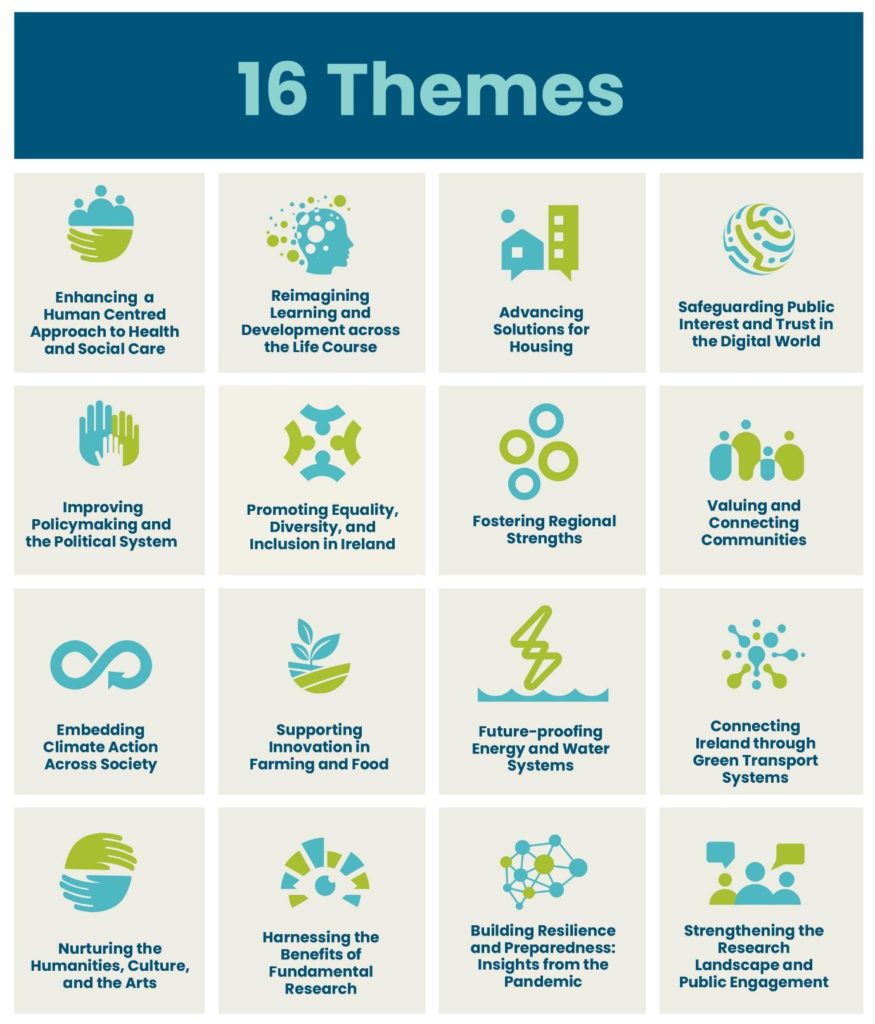
The Expert Committee report also set out five recommendations that the public would like researchers to explore to create a better future arising from their analysis:
- Solutions for the future cannot be developed in silos – everything is connected. Researchers should explore ways to live within our planetary boundaries with integrated sustainable solutions.
- Accelerated research efforts are required in mental health and infectious diseases to improve quality of life and strengthen Ireland’s resilience in the face of future disruptions.
- Researchers should design, implement, and evaluate bespoke Irish solutions for services and infrastructure (from housing to transport and energy). These efforts should account for our unique geography, society, and heritage so that they benefit all.
- Irish research needs to be at the cutting edge of emerging digital technologies that improve people’s lives, increase public trust, and make for a more inclusive and fair society.
- Research is required to harness the power of communities to generate local and systemic change in Ireland (from green initiatives to education and the future of work).
In July 2022, Minister for Further and Higher Education, Research, Innovation and Science Simon Harris published the outcomes from Creating Our Future. The Expert Committee and Campaign Reports, together with the +18,000 submission have all been published online at www.creatingourfutre.ie.
The next steps
Policy makers, researchers, educators and students at all levels are encouraged to explore this rich database as a source of new ideas that stem from what is on the minds of the people of Ireland. The “Book of Inspiration” contains the voice of the public from a unique period, it reflects their desires to improve our society, ideas for opportunities to pursue and what should be investigated to address the challenges we face.
The outputs and recommendations from Creating Our Future are integrated into the Irish Government’s national research and innovation strategy Impact 2030. In addition, they are aligned with several ongoing and upcoming programmes, including the National Challenge Fund which is funded by the European Union’s Resilience and Recovery Fund.
We in Science Foundation Ireland (SFI) were entrusted to manage the campaign and we worked hand in hand with a broad suite of stakeholders, ably assisted by Havas Ireland who we contracted to support the programme. The SFI team continues to work with Government and with all of our partners to support the implementation of the recommendations. Everyone has a role to play in ensuring that the voice of the public is reflected in their work. We encourage everyone to seek inspiration from the people of Ireland by reviewing the Expert Committee Report and exploring the ideas in the interrogable database on the Creating Our Future website.
Project overview
Links
Database of ideas submitted – the submissions may be searched by key word, theme, location and age range. The entire database of submissions may also be downloaded for further analysis.
Creating Our Future Expert Committee Report – this report details the analysis of the submissions and the findings.
Creating Our Future Campaign Report – this report tells the story of the initiative including how we engaged with the public and who was involved.
Sponsor
Creating Our Future was an all of Government initiative. It was initiated by Simon Harris T.D., Minister for Further and Higher Education, Research, Innovation and Science and operationalised by Science Foundation Ireland, on behalf of the Minister and his Department.
Budget
The initiative was approved at Cabinet and a budget of €1.5m was allocated to the project from the Department. Science Foundation Ireland directed existing budgets to support the campaign. The total cost of the project was in the region of €2m ex VAT.
Goals (quantitative/qualitative)
The primary objective of the Creating Our Future campaign was to stimulate a national conversation to elicit ideas from the public on the role research can play in addressing challenges and opportunities in their lives. The campaign sought to be inclusive and accessible for all and reach members of the public who might not normally be engaged with research or similar campaigns.
A goal of 10,500 submissions was set. This was target was based on the response received by the Flemish Research Agenda.
Target Groups
The people of Ireland. A particular emphasis was placed on those that can be hard to reach, underrepresented minority groups, Gen Z and those that do not normally engage with the research agenda. We were careful to not use the word “citizen” as we wanted to ensure that all people who call Ireland home could engage – regardless of their citizenship. We also reached out to the people of Ireland who are not living in the country at this time. With the help of our colleagues at the Department of Foreign Affairs and Trade, Creating Our Future events were hosted by Irish Embassies overseas. The Irish Embassy network also supported the dissemination of the campaign information to drive the diaspora audience to the Creating Our Future website so that the could make a submission online.
Further data on target achievement
Submission levels timeline





The editorial responsibility for this article lies with Anna Henschel. Guest contributions do not necessarily reflect the opinion of our editorial team.

